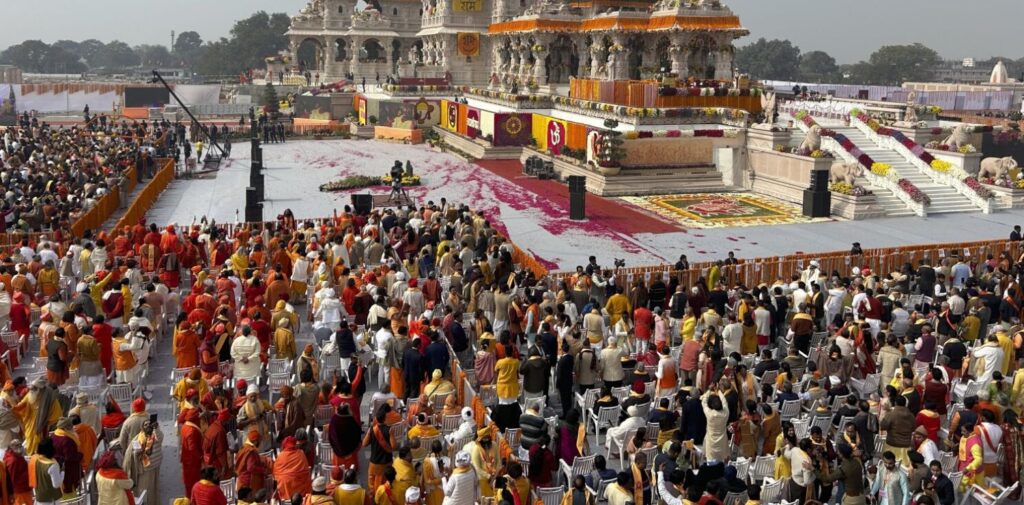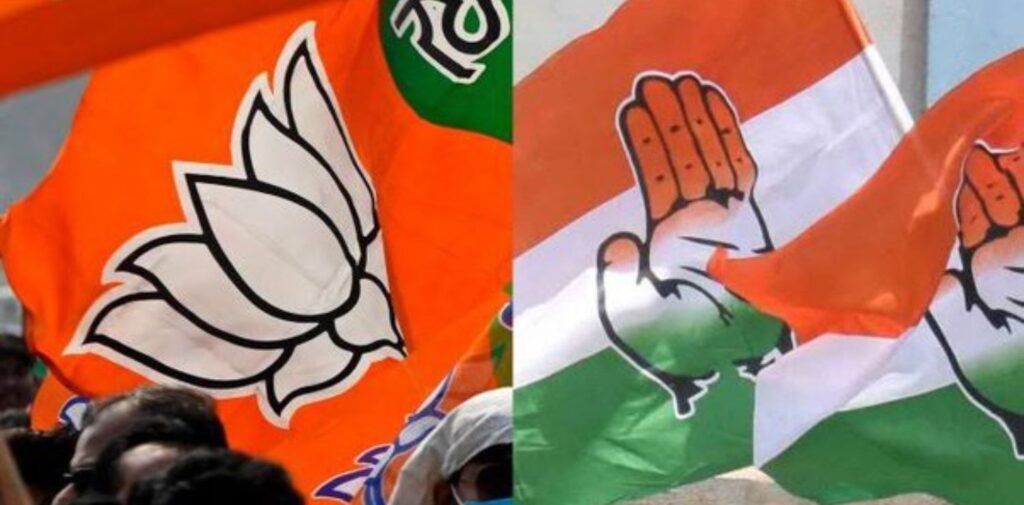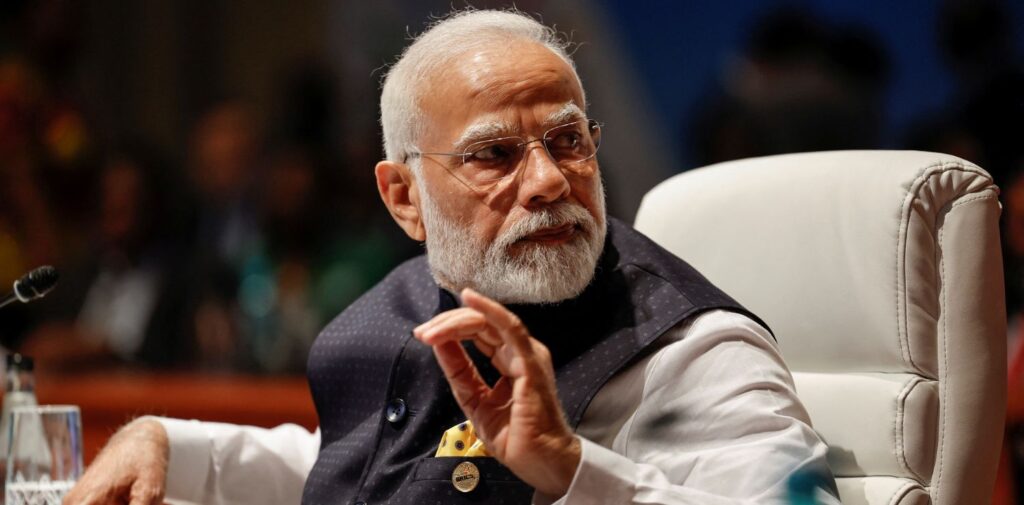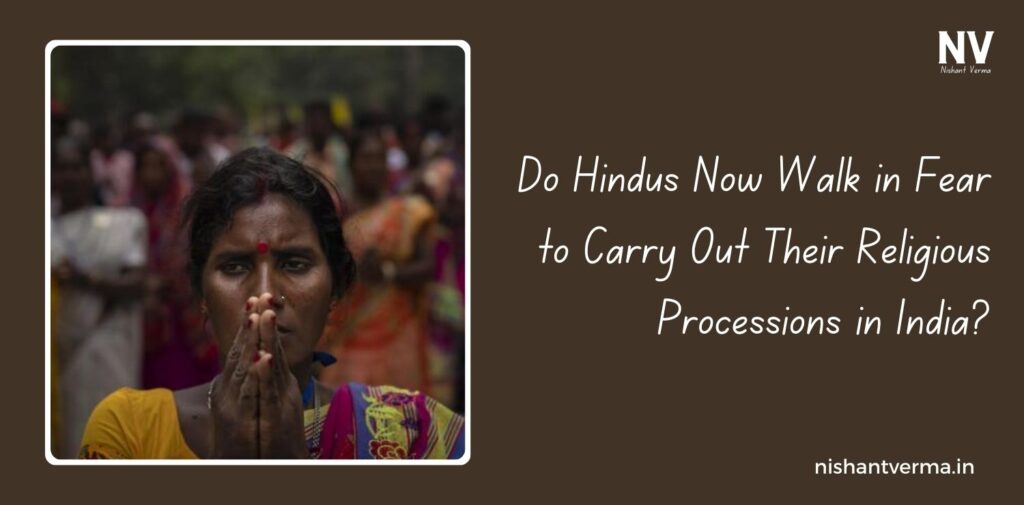Hindu Religious Processions in India, particularly those involving the Hindu community, have long been a significant part of the country’s vibrant cultural and religious fabric. From Ram Navami to Hanuman Jayanti, these events symbolize the faith and spirit of millions. However, a question that has increasingly come to the fore is whether Hindus now carry out their religious processions with a sense of fear or hesitation.
Over the last few decades, tensions surrounding Hindu religious processions have intensified, with reports of clashes and violence emerging from different parts of the country. While some argue that this is a product of longstanding communal discord, others suggest that the political landscape is also to blame. The blame game has often split between two poles: one that emphasizes the rise of Islamist aggression and the other pointing fingers at the Congress-led political environment that ruled India for over six decades.
Has Hindu Religious Freedom Been Compromised?
In recent years, especially under the current Bharatiya Janata Party (BJP) government, there has been an effort to reclaim Hindu religious and cultural pride. The BJP government is seen by many Hindus as a protector of their rights and religious freedom. In fact, some even argue that under BJP rule, Hindus feel more empowered to express their faith publicly through processions and other religious gatherings. The government’s stance on Hindutva (a form of Hindu nationalism) has reinforced this sentiment for many within the community.

But has this truly eradicated the fear? Or are deep-seated issues still simmering below the surface?
Several incidents of violent confrontations during Hindu processions have raised alarming concerns. In states like West Bengal, Rajasthan, and Madhya Pradesh, Hindu processions have often turned into flashpoints of communal violence. Reports from Khargone in Madhya Pradesh reveal how peaceful Hindu processions were attacked, leaving Hindus in a state of vulnerability. Local residents have openly voiced their frustration, claiming that they are “fed up” with repeated attacks on their religious processions.
These clashes, where Hindus are often seen as the victims, fuel a larger narrative of Hindus feeling targeted during religious events. A ground report from Khargone, published by Swarajya, highlights how attacks on Hindu religious processions have left the local Hindu population living in fear. While they expect protection from the law and order machinery, such incidents have sparked the feeling that their religious freedom is under threat in what is supposed to be their homeland – a Hindu-majority nation.
The Role of Islamist Aggression
Many Hindu organizations, including the Vishva Hindu Parishad (VHP) and Bajrang Dal, believe that Islamist groups have deliberately targeted Hindu processions as a means of asserting dominance. These organizations argue that in areas where the Muslim population is significant, Hindu processions often face disruption and violence. The attacks, they claim, are not spontaneous acts but rather premeditated attempts to curtail Hindu religious expression.
In August 2023, OpIndia reported on a series of incidents where Islamist groups had attacked Hindu processions. The article pointed out that many Hindus felt defenseless against such violence, and despite the BJP’s stance on protecting Hindu rights, these incidents have continued to occur. What is alarming, according to some, is the audacity with which these attacks are carried out, leading to a sense of fear among Hindus to openly celebrate their festivals.
Is this fear justified? Or is it simply a reaction to isolated incidents?
Congress’ Legacy: A Long Shadow of Appeasement Politics?
While the BJP has made strides in promoting Hindu rights, a significant part of the blame for the current tensions is placed on the Congress party’s legacy. For over six decades, the Congress party governed India, and during this time, many accuse it of fostering a culture of minority appeasement. Critics argue that Congress adopted policies that prioritized Muslim vote banks, often at the expense of Hindu rights.
The Congress has frequently been accused of turning a blind eye to Islamist aggression and promoting policies that undermined Hindu religious freedom. Under the guise of secularism, many believe Congress failed to address growing radicalism within certain Muslim communities, thereby allowing a hostile environment to develop for Hindus.

As a result, some Hindus now feel that they are second-class citizens in their own country, despite being the majority. This sentiment is fueled by incidents where the police and local authorities, under Congress-led governments, have been accused of inaction when it comes to protecting Hindu processions.
In an article published by the Economic Times, it was noted that allowing religious intolerance in a secular country is dangerous, and the judiciary has warned against it. Yet, Congress governments in certain states have been accused of doing exactly that – allowing a culture of intolerance to flourish.
Muslim Dominance: Fact or Fiction?
One of the central narratives surrounding Hindu fear during religious processions is the idea that Muslims, despite being a minority, have asserted dominance over the Hindu majority. This has led to many Hindus feeling marginalized, especially in areas where Muslims form a significant part of the population.
Many believe that Muslims have not only asserted dominance socially but have also influenced the political and legal systems to favor their community. This perception of Muslim dominance is often amplified by incidents where Hindus have been attacked for carrying out religious processions, while the perpetrators face little to no consequences.
Quora discussions reflect a variety of opinions on this issue. Some argue that Muslims in India do not hold any real power and that the fear among Hindus is exaggerated. Others, however, claim that Muslims, through sheer numbers in certain areas, have created an atmosphere of hostility towards Hindus. They suggest that Muslims have leveraged their minority status to gain political clout, which in turn has allowed them to suppress Hindu religious expression.
Is BJP Truly Making a Difference?
Since the BJP came to power, there has been a noticeable shift in the political narrative surrounding Hindu religious rights. Under Prime Minister Narendra Modi, the BJP has positioned itself as the protector of Hindu culture and traditions. The government’s strong stance on issues like the construction of the Ram Temple in Ayodhya and the abrogation of Article 370 in Jammu and Kashmir has reassured many Hindus that their rights are being safeguarded.

However, despite the BJP’s efforts, incidents of communal violence during Hindu processions persist. Some critics argue that while the BJP’s rhetoric is strong, more needs to be done at the grassroots level to prevent such violence. Ensuring the safety of Hindu processions should not just be a political talking point; it requires active measures on the ground, including better policing, stricter laws against communal violence, and ensuring accountability for those who incite or participate in attacks.
The Real Culprits: Congress and Radical Islamists?
As this debate continues, it is essential to recognize that both political and religious elements have contributed to the current atmosphere. Congress’ appeasement policies, combined with the rise of radical Islamist elements, have undoubtedly created a situation where many Hindus feel their religious freedoms are under threat.
The question that remains is whether this fear is justified or whether it is being exaggerated for political gain. Hindus, as the majority community, should not have to walk in fear during their religious processions. But the reality on the ground tells a different story, one where fear and uncertainty still loom large.
Your Opinion Matters: Hindu Religious Processions in India
As we examine the complexities surrounding Hindu religious processions, it is clear that there are multiple layers to this issue. From Congress’ legacy of appeasement to the rise of Islamist aggression and the BJP’s efforts to protect Hindu rights, the debate is far from straightforward. What is your take on this matter? Do you believe Hindus now walk in fear during their religious processions, or is the fear exaggerated? How should the government and society address this issue? Share your thoughts and opinions.




